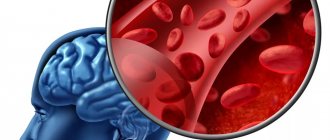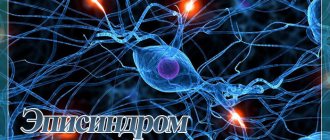Alcoholic dementia is brain damage that occurs as a result of long-term drinking of large amounts of alcohol. Clinically, this form of dementia is no different from others. Ethyl alcohol disrupts the functions of neurotransmitters that are responsible for human emotions and behavior. Long-term use of alcohol forms stable addiction and mental disorders. According to statistics, alcoholic dementia is most often diagnosed in men over 55 years of age. In the international classification of diseases ICD-10, alcoholic dementia is coded F10.6.
Doctors at the Yusupov Hospital diagnose and treat alcoholic dementia. Modern medical equipment that meets safety and quality requirements is used for the examination. Therapy is prescribed taking into account the individual characteristics of patients. Drugs are selected in accordance with European recommendations for the treatment of alcoholic dementia.
Causes of alcoholic dementia
Neuronal damage occurs due to prolonged exposure to aceldehyde. This is a substance formed during the breakdown of ethanol. Aceldehyde causes destruction of the vascular wall and provokes the formation of atherosclerosis. Chronic alcohol intoxication causes changes in brain structures, disruption of blood microcirculation and damage to the central nervous system. Men over 55 years of age are susceptible to dementia due to alcoholism. However, doctors do not rule out an earlier onset of the disease. Alcohol intoxication provokes the formation of the following causes leading to dementia:
- cerebrovascular accident;
- chronic cerebral ischemia;
- arterial hypertension;
- stenosis;
- atherosclerosis;
- Alzheimer's disease;
- Parkinson's disease;
- metabolic pathology.
The risk of developing alcoholic dementia increases with the presence of tumors, a history of head trauma, and a hereditary predisposition. Elimination of the etiological factor is necessary for complex treatment. If therapy is not started in time, alcoholic dementia can cause early disability.
Literature:
- Amasyants R. A., Amasyants E. A. Clinic of intellectual disabilities: a textbook for students of higher educational institutions studying in the specialties: 050712.65 (031500) - typholopedagogy; 050713.65 (031600) - pedagogy of the deaf; 050714.65 (031700) - oligophrenopedagogy; 050715.65 (031800) speech therapy; 050716.65 (031900) - special psychology; 050717.65 (032000) - special preschool pedagogy and psychology - M.: Ped. island of Russia, 2009 - 320 p.
- Zharikov M. N. Fundamentals of psychiatry for general practitioners - M.: Medicine, 2001 - 254 p.
- Eryshev O.F., Sprints A.M. Handbook of a family doctor. Psychiatry - M.; St. Petersburg: Dilya, 2005 - 234 p.
Types of alcoholic dementia
Depending on the location of the lesion, the following types of alcoholic dementia are distinguished:
- Subcortical. Characterized by a narrowing of consciousness, fixation on imaginary problems. Patients are only concerned about themselves. Subcortical alcoholic dementia develops gradually. In the early stages, symptoms of depression and emotional lability appear. At the same time, memory is not impaired for a long time.
- Cortical. Accompanied by a more pronounced clinical picture and rapid progression. At the beginning of the disease, absent-mindedness and forgetfulness appear. As alcoholic dementia progresses, disorientation in time and space appears. Late stages are characterized by hallucinations.
- Multifocal. The clinical picture combines signs of subcortical and cortical lesions. The result is multifocal dementia. The patient's behavior becomes unpredictable, and complete personality degradation is observed. In the later stages of the disease, constant outside care is required.
The rate of progression of alcoholic dementia depends on the location of the pathological process. The destruction of neurons can quickly move to another zone with the formation of a multifocal lesion. If, against the background of alcohol dependence, there is an addiction to drugs, then the rate of progression of alcoholic dementia increases several times.
Expert opinion
Author: Vladimir Vladimirovich Zakharov
Neurologist, Doctor of Medical Sciences, Professor, Head of the Center for Diagnostics and Treatment of Memory Disorders
Alcoholic dementia is a gradual shutdown of brain function due to chronic intoxication with alcohol and metabolic products. Like any other type of dementia, it cannot be cured, but there is a chance to slow down its progression. And the sooner the patient turns to specialists, the better.
Dementia is characteristic of older age, but now we are faced with early manifestations of dementia. And one of the most significant reasons is alcohol. Unfortunately, in Russia there are no statistics on alcoholic dementia, because few people deal with such a problem. If you believe WHO data, then most often residents of the countries of the former USSR and some Asian countries, as well as Finland, suffer from dementia due to alcohol consumption.
The manifestations of all types of dementia are similar: personality degradation, memory loss, emotional lability, inability to care for oneself, and hallucinations. If the cause is alcohol, then patients are more aggressive. There is no need to think that dementia occurs with the last stage of alcoholism. With the constant use of “strong” drinks, many symptoms of the disease appear.
Damage to nervous tissue is irreversible, but modern drugs can slow down the degradation. Of course, you can’t do this with medications alone, and you need an integrated approach.
Stages of the disease
The rate of development of alcoholic dementia depends on many factors: the amount of alcohol consumed, concomitant diseases, genetic inheritance, drug use. This means that dementia can develop differently in different patients, but still, as a rule, the disease goes through four main stages:
- Stage one: initial. The only external sign is emotional disorders - the appearance of isolation, the predominance of depressive moods, the loss of previous interests and hobbies.
- Stage two: easy. Mild dysfunctions of memory, attention and logical thinking are observed: patients find it difficult to remember or concentrate, and any intellectual stress comes at the cost of noticeable effort.
- Stage three: middle. Symptomatically repeats the second stage, but the disturbances are much more pronounced: patients clearly do not control their attention, cannot remember anything, have difficulty remembering past events, and intellectually demonstrate violations of logical coherence, consistency of judgments or inferences.
- Stage four: severe. There is a complete disintegration of the personality with disruption of all mental functions, loss of moral principles and the development of various mental disorders.
Stages of alcoholic dementia
Alcohol-induced dementia occurs in several stages. Among them are:
- Elementary. Clinical symptoms of damage to the central nervous system are not expressed. Depression gradually develops, detachment from other people, and withdrawal into oneself arise.
- Mild dementia. The toxic effects of aceldehyde lead to impaired memory and attention. As the lesion progresses, disorientation develops.
- Moderate dementia. Characterized by impaired mental activity and speech. At this stage, patients completely withdraw into themselves.
- Severe dementia. Total personality collapse. Patients do not recognize loved ones and do not orient themselves in time and space. The ability to self-service is completely lost.
Consequences
Relatives and friends of persons with alcohol dependence are advised to take into account the following information:
- The main consequence of alcoholic dementia is complete maladaptation of a person.
- The patient is unable to adequately communicate with others and lead a full life.
- Relatives of an alcohol-dependent person need to provide him with timely help.
- At the first signs of addiction, it is recommended to seek qualified help from narcologists.
- By inviting a specialist to your home, you can prevent the development of dementia and save the patient from addiction.
- It is necessary to understand that with such a diagnosis a person can live an average of 4.5 - 5 years.
- With rapid progression of the disease, death can occur within six months.
- The patient can die not only from dementia, but also from stroke and other concomitant diseases, including accidents, which is due to the characteristics of the disease. Correct behavior of relatives is very important!
Clinical picture of alcoholic dementia
Alcohol-induced dementia is characterized by gradual damage to neurons. The toxic effect of aceldehyde in the initial stages of the disease may be invisible to the patient himself, as well as to others. As the condition worsens, the following clinical symptoms appear:
- Memory impairment. Long-term memory is affected initially. The patient does not remember events or dates. Subsequently, short-term memory is impaired.
- Emotional lability. Alcohol addicts are characterized by emotional instability. In connection with the development of alcoholic dementia, aggression and infantilism appear. Patients can talk to themselves. Retardation appears. Actions become thoughtless.
- Depression. Often mistaken for chronic fatigue.
- Disorientation in time and space. Characteristic of late stages of alcoholic dementia. Patients do not understand where they are and cannot determine the time of day.
- Periods of enlightenment. Characteristic of the early stages of the disease. Another reason for enlightenment is the treatment performed.
- Dropping out of social life. As a result of alcoholic dementia, the patient becomes isolated on himself. The lives of those around him cease to concern him.
- Loss of professional skills. As nerve cell damage progresses, patients become unable to even perform self-care.
- Disturbance of the sleep-wake period. Bedtime may shift to morning or afternoon hours. Patients can sleep for several hours, while staying awake for several days in a row.
- Damage to the central nervous system. In this case, hand tremors, decreased muscle tone, slow reaction of the pupils to light, unsteady gait, and speech impairment appear. Such symptoms are considered a sign of irreversibility of the condition. The symptoms cannot be treated.
Complications
Alcohol-induced dementia has severe consequences. The brain atrophies, most of its functions turn off. The patient is exhausted, the body mass index reaches critical values.
Ethyl alcohol toxins affect all organs. The liver suffers, it becomes inflamed, alcoholic hepatitis begins, which ends with necrosis of the organ parenchyma and its complete failure.
Since fluid is eliminated from the body through the kidneys, toxins also affect them. The glomeruli stop working to filter blood plasma. Toxins accumulate in the body. Renal failure develops, which leads to failure of one and then both kidneys.
Accumulated toxins affect the pulmonary and cardiovascular systems, causing failure of these organs.
Damage to the brain ends with inhibition of reflexes, mental and speech activity. The connection with the outside world is completely lost. Gradually the patient falls into a vegetative state.
Life expectancy is sharply reduced. Most alcoholics live in unsanitary conditions, so they often develop infectious, viral and fungal diseases.
Diagnosis of alcoholic dementia
Diagnosis of alcoholic dementia requires a comprehensive approach. This form of dementia can be detected using an MRI or CT scan. Tomography allows you to establish the localization of the pathological process. Alcoholic dementia requires differential diagnosis with other brain lesions. The early stage of dementia is often mistaken for mental disorders, symptoms of tumor formation or intracranial hematomas.
The Yusupov Hospital uses modern medical equipment to detect the disease. Thanks to this, it is possible to detect neuronal damage even in the early stages. This allows for timely treatment and relieves the patient of pathological symptoms.
What do those who have encountered or may encounter this problem need to know?
Alcoholic dementia begins its journey with excessive alcohol consumption. This turns into binge drinking of various forms. In order not to end up with alcoholic dementia, you need to be moderate in your drinking. Read our article How to get rid of a hangover by breaking the vicious cycle of binge drinking. But if you find it difficult to refuse or stop, we will help you. Our center has everything necessary for the comprehensive treatment of alcoholism associated with dementia of various forms. Qualified medical and psychological assistance for a reasonable fee will help you cope with the problem and provide the necessary support.
Treatment of alcoholic dementia
Alcohol-induced dementia is an irreversible condition. The main goals of therapy are to slow the progression of the disease and relieve symptoms. Treatment is selected depending on the stage of the disease.
- Easy. The initial stages of alcoholic dementia are treated with antidepressants and vitamin preparations. In addition, neurologists prescribe medications that normalize cerebral circulation and improve vascular function.
- Moderate. More severe clinical symptoms require extended therapy. For this purpose, drugs that relieve psychopathic symptoms are added to treatment.
- Heavy. Requires constant outside care. To alleviate the condition, sedatives and antipsychotic drugs are prescribed.
Treatment of alcoholic dementia is impossible without complete cessation of alcohol consumption. Drug therapy is complemented by dietary nutrition, psychotherapy, and physiotherapy. Doctors at the Yusupov Hospital pay special attention to concomitant diseases. Without stabilizing blood pressure readings and normalizing blood glucose levels, therapy will be considered ineffective. Due to the specifics of the condition, it is recommended that the first months of treatment be carried out in a hospital setting. At the Yusupov Hospital, an individual treatment plan is developed for each patient. Therapy is selected taking into account the stage of alcoholic dementia, the presence of concomitant diseases and the patient’s age. The drugs used are included in the list of European standards for the treatment of dementia due to alcoholism. All patients undergo consultation with a psychotherapist. This allows us to identify the causes of pathological addiction to alcohol. The method is most effective at the early stage of the disease.
Forecast and prevention of alcoholic dementia
Most often, brain damage caused by alcoholism is an irreversible condition. A favorable prognosis is only possible if dementia is diagnosed in the early stages. Slow progression of the pathological condition leads to late seeking medical help. As neuronal damage progresses, the prognosis becomes poor. Severe stages of the disease require constant outside care and lead to disability.
Unlike other forms of dementia, alcoholic dementia is preventable. To do this, you must follow the following medical recommendations:
- lead a healthy lifestyle;
- adhere to the principles of rational and balanced nutrition;
- drink alcohol in moderation or completely abstain from it;
- timely treatment of somatic diseases.
Self-medication for alcoholic dementia is not possible. When the first signs of the disease appear, you should consult a doctor.
You can get diagnosed and treated for alcoholic dementia at the Yusupov Hospital. Experienced neurologists individually select therapy that meets international standards for the treatment of alcoholic dementia. You can make an appointment by phone.
Doctors' recommendations
Smoking, alcoholism, advanced age, genetic predisposition, and stress greatly increase the likelihood of developing dementia.
Cases have been recorded in which the diagnosis of dementia was made to persons aged 30 years . To prevent this from happening, it is recommended to promptly seek medical support from narcologists and psychiatrists. The possibility of implementing treatment allows you to maintain anonymity against the backdrop of the high effectiveness of the actions taken.
Dementia is the consequences of the influence of alcohol on the brain; mental illnesses can also be associated:









